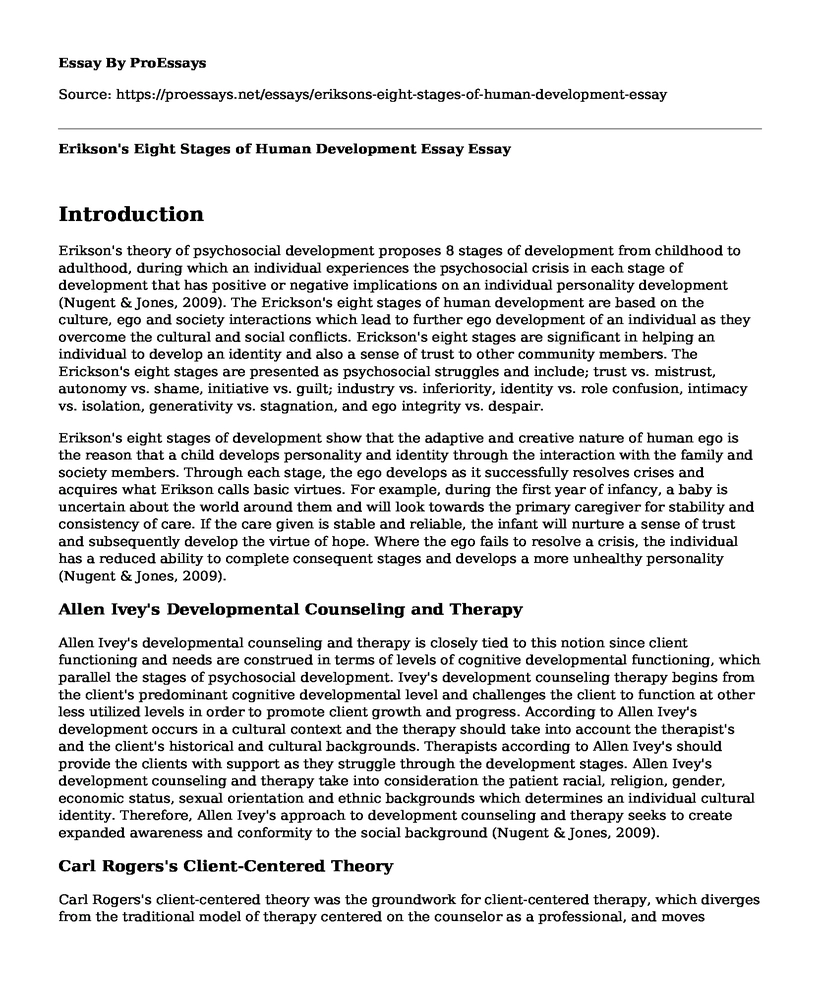Introduction
Erikson's theory of psychosocial development proposes 8 stages of development from childhood to adulthood, during which an individual experiences the psychosocial crisis in each stage of development that has positive or negative implications on an individual personality development (Nugent & Jones, 2009). The Erickson's eight stages of human development are based on the culture, ego and society interactions which lead to further ego development of an individual as they overcome the cultural and social conflicts. Erickson's eight stages are significant in helping an individual to develop an identity and also a sense of trust to other community members. The Erickson's eight stages are presented as psychosocial struggles and include; trust vs. mistrust, autonomy vs. shame, initiative vs. guilt; industry vs. inferiority, identity vs. role confusion, intimacy vs. isolation, generativity vs. stagnation, and ego integrity vs. despair.
Erikson's eight stages of development show that the adaptive and creative nature of human ego is the reason that a child develops personality and identity through the interaction with the family and society members. Through each stage, the ego develops as it successfully resolves crises and acquires what Erikson calls basic virtues. For example, during the first year of infancy, a baby is uncertain about the world around them and will look towards the primary caregiver for stability and consistency of care. If the care given is stable and reliable, the infant will nurture a sense of trust and subsequently develop the virtue of hope. Where the ego fails to resolve a crisis, the individual has a reduced ability to complete consequent stages and develops a more unhealthy personality (Nugent & Jones, 2009).
Allen Ivey's Developmental Counseling and Therapy
Allen Ivey's developmental counseling and therapy is closely tied to this notion since client functioning and needs are construed in terms of levels of cognitive developmental functioning, which parallel the stages of psychosocial development. Ivey's development counseling therapy begins from the client's predominant cognitive developmental level and challenges the client to function at other less utilized levels in order to promote client growth and progress. According to Allen Ivey's development occurs in a cultural context and the therapy should take into account the therapist's and the client's historical and cultural backgrounds. Therapists according to Allen Ivey's should provide the clients with support as they struggle through the development stages. Allen Ivey's development counseling and therapy take into consideration the patient racial, religion, gender, economic status, sexual orientation and ethnic backgrounds which determines an individual cultural identity. Therefore, Allen Ivey's approach to development counseling and therapy seeks to create expanded awareness and conformity to the social background (Nugent & Jones, 2009).
Carl Rogers's Client-Centered Theory
Carl Rogers's client-centered theory was the groundwork for client-centered therapy, which diverges from the traditional model of therapy centered on the counselor as a professional, and moves towards a nondirective empathic approach which encourages client participation in the therapeutic process. This is a move towards integrative therapy and it encourages theoretical integration. However, a major criticism is that it is difficult to consolidate a theoretical model based on different epistemological and theoretical presumptions (Nugent & Jones, 2009). The client-centered therapy according to Carl Rogers is based on the nature of human beings to tend to be good, have an actualizing tendency and have a desire to become the best people that they can possibly become. According to Carl Rogers patients tend to seek for guidance and direction and the therapists should focus on creating a comfortable therapeutic environment that is non-judgmental and empathetic which primary emphasis is unconditional positivity towards the patient (Nugent & Jones, 2009).
Reference
Nugent, F.A. & Jones, K.D. (2009) Introduction to the Profession of Counseling, 5th ed., Upper Saddle River, NJ: Pearson/Merrill
Cite this page
Erikson's Eight Stages of Human Development Essay. (2022, May 17). Retrieved from https://proessays.net/essays/eriksons-eight-stages-of-human-development-essay
If you are the original author of this essay and no longer wish to have it published on the ProEssays website, please click below to request its removal:
- Outliers: The Story of Success
- Soft Power Influence Essay
- Relationship Between the Counsellors and the Clients and Spirituality Paper Example
- Generations Memoir
- Early Traumatic Experiences & Parental Reflective Functioning - Essay Sample
- Paper Example on Minorities in the Streets: Who Do You See?
- Essay Sample on Psychosocial Factors Impacting Health Care Professional Wellbeing & Patient Education







